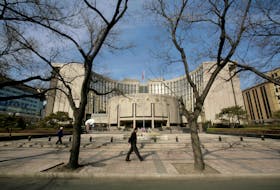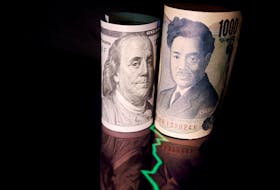By Leika Kihara
TOKYO (Reuters) - The benefits of the Bank of Japan's ultra-loose monetary policy still outweigh the costs, Deputy Governor Masazumi Wakatabe said on Thursday, signaling his preference for maintaining massive stimulus to push up inflation.
Years of heavy money printing by the BOJ have pushed down long-term interest rates near zero, adding to a squeeze on margins for Japan's regional banks already suffering from a dwindling population and weak loan demand.
Wakatabe, however, defended the BOJ's stimulus program, saying it has created jobs, boosted economic growth and put an end to a period when consumer prices continued to decline.
"When I look at developments since we introduced quantitative and qualitative easing (QQE), the outcome is clearly positive," he said, referring to the BOJ's decision to adopt a massive asset-buying program in 2013.
"There is debate about what to do with the demerits of prolonged monetary easing. But I still feel the benefits of QQE outweigh the costs," Wakatabe told parliament on Thursday.
The BOJ's nine-member board is divided between those like Wakatabe who see room to ramp up stimulus to achieve the bank's elusive inflation target, and those who are increasingly worried about the rising cost of prolonged easing.
Japan's three largest banks all reported lower annual profits on Wednesday, highlighting the challenges faced by the sector as the world's third-largest economy looks to be headed for another downturn.
In a further nod to growing strains on banks, Moody's said on Thursday it changed its outlook for Japan's banking sector to negative from stable on the view their overall creditworthiness will worsen in the next 12-18 months.
"Japan's extremely accommodative monetary policy has helped the economy sustain growth, but it has also depressed banks' profitability and consequently driven them to take more risks," said Shunsaku Sato, a vice president and senior credit officer of Moody's.
"We expect the Bank of Japan to leave monetary policy unchanged because inflation is still below its 2% target amid anemic economic growth."
After years of huge asset buying failed to fire up inflation to its target, the BOJ added yield curve control to QQE. Under the policy, it now guides short-term rates at minus 0.1 percent and long-term yields around zero percent.
Wakatabe said he expects the yield curve to steepen once Japan emerges from deflation, as markets price in expectations that inflation will accelerate.
"Our biggest mandate is to achieve price stability," Wakatabe said. "We will do our utmost to maintain financial stability. But we are adopting YCC with QQE for the purpose of ending deflation," he said.
Japan's core consumer prices rose 0.8 percent in March from a year earlier, still distant from the BOJ's target.
(Reporting by Leika Kihara; Editing by Chris Gallagher & Shri Navaratnam)









